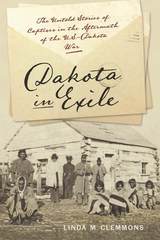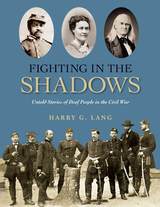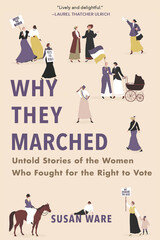
Historian Linda Clemmons examines the surviving letters from Robert and Sarah; other Dakota language sources; and letters from missionaries, newspaper accounts, and federal documents. She blends both the personal and the historical to complicate our understanding of the development of the Midwest, while also serving as a testament to the resilience of the Dakota and other indigenous peoples who have lived in this region from time immemorial.


Lang pieces together hundreds of stories, accompanied by numerous historical images, to reveal a powerful new perspective on the Civil War. These soldiers and civilians were not “disabled” by their deafness. On the contrary, despite the marginalization and paternalism they experienced in society, they were able to apply their skills and knowledge to support the causes in which they ardently believed.
Fighting in the Shadows is a story of how deaf civilians and soldiers put aside personal concerns about deafness, in spite of the discrimination they faced daily, in order to pursue a cause larger than themselves. Yet their stories have remained in the shadows, leaving most Americans, hearing and deaf, largely unaware of the deaf people who made significant contributions to the events that changed the course of our nation’s history. This book provides new insights into Deaf history as well as into mainstream interpretations of the Civil War.

“Lively and delightful…zooms in on the faces in the crowd to help us understand both the depth and the diversity of the women’s suffrage movement. Some women went to jail. Others climbed mountains. Visual artists, dancers, and journalists all played a part…Far from perfect, they used their own abilities, defects, and opportunities to build a movement that still resonates today.”
—Laurel Thatcher Ulrich, author of Well-Behaved Women Seldom Make History
“An intimate account of the unheralded activism that won women the right to vote, and an opportunity to celebrate a truly diverse cohort of first-wave feminist changemakers.”
—Ms.
“Demonstrates the steady advance of women’s suffrage while also complicating the standard portrait of it.”
—New Yorker
The story of how American women won the right to vote is usually told through the lives of a few iconic leaders. But movements for social change are rarely so tidy or top-heavy. Why They Marched profiles nineteen women—some famous, many unknown—who worked tirelessly out of the spotlight protesting, petitioning, and insisting on their right to full citizenship.
Ware shows how women who never thought they would participate in politics took actions that were risky, sometimes quirky, and often joyous to fight for a cause that mobilized three generations of activists.
The dramatic experiences of these pioneering feminists—including an African American journalist, a mountain-climbing physician, a southern novelist, a polygamous Mormon wife, and two sisters on opposite sides of the suffrage divide—resonate powerfully today, as a new generation of women demands to be heard.
READERS
Browse our collection.
PUBLISHERS
See BiblioVault's publisher services.
STUDENT SERVICES
Files for college accessibility offices.
UChicago Accessibility Resources
home | accessibility | search | about | contact us
BiblioVault ® 2001 - 2024
The University of Chicago Press









